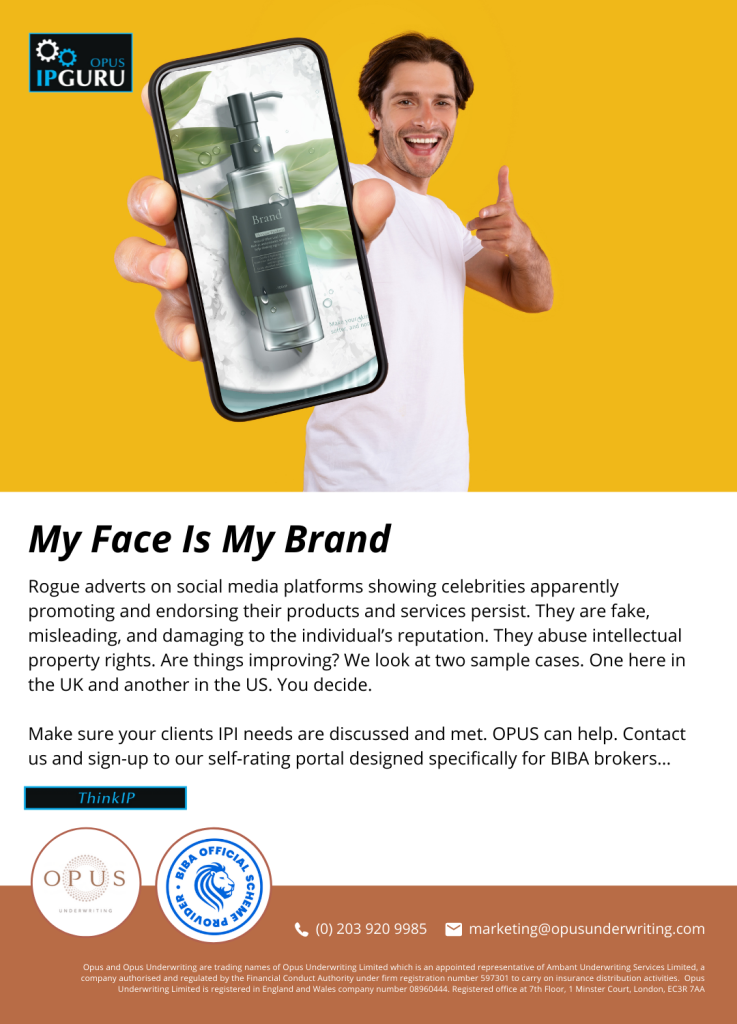Product misplacement
Trust in me
It goes something like this. A celebrity image is misused to give credibility or just plain click-bait teaser-interest to an otherwise forgettable or banal advertisement. Problem is, celebrities are humans too, capable of being offended, defamed, and genuinely hurt but with a depth of pocket greater than most, giving them the wherewithal to defend themselves. But it’s still a David and Goliath battle when the defendant is Facebook – as was – now Meta. Proof, incidentally -if any were needed – that changing the name of a nuclear power facility guilty of releasing toxic radioactive waste into the sea doesn’t hide the reality of continuing poor process, should it persist. It’s still the same power station. You see, the offending adverts appear on Meta/Facebook’s website.
Facebook say, it’s not our fault we’re doing all we can, we’re just a social media platform. The Claimant says you must do more to prevent rogue advertisers exploiting my image. This happened on your watch. Monitor your advertisers like any publisher should. Positions are taken, lawyers instructed and courts troubled.
Two examples, one in the UK which you are probably aware of and one more recently in the US that you probably aren’t, bring this battle into view on these pages. Read on and decide for yourself if anything much has changed.
Money-saving matters
The first is a 2018 dispute involving our own ‘National Treasurer’ Martin Lewis. He’ll love being called that. He’s more than earned it. Martin Lewis was the victim of scam adverts on Facebook. What upset Martin so much was that a number of members of the public were fooled into wrongly thinking he endorsed the products advertised and made the promises claimed leading to some innocent folk losing money as a result. Understandably, he couldn’t tolerate this and nobly brought a personal action in the High Court seeking damages that would punish Facebook for its inaction. Martin Lewis wanted change, he wanted these scams to stop and Facebook to recognise its accountability.
At the time, Martin Lewis said in a statement to the press:
“Enough is enough. I’ve been fighting for over a year to stop Facebook letting scammers use my name and face to rip off vulnerable people – yet it continues. I feel sick each time I hear of another victim being conned because of trust they wrongly thought they were placing in me…”
“I don’t do adverts. I’ve told Facebook that. Any ad with my picture or name in is without my permission. I’ve asked it not to publish them, or at least to check their legitimacy with me before publishing. This shouldn’t be difficult – after all, it’s a leader in face and text recognition. Yet it simply continues to repeatedly publish these adverts and then relies on me to report them, once the damage has been done.”
One such advert misusing an image of Martin Lewis claimed:
“Martin Lewis lends a hand to British families with revolutionary Bitcoin Home Based Opportunity”
Clearly, an advert promoting binary trading and a near-certain money-loser. The antithesis of all Martin Lewis stands for.
In one year, it was alleged Facebook had published over 50 fake Martin Lewis adverts. The nub of Lewis’s counterargument to Facebook’s defence that it’s a platform not a publisher, was neatly summarised:
“…it is being paid to publish, promulgate and promote what are often fraudulent enterprises. My hope is this lawsuit will force it to change its system. Nothing else has worked. People need protection.”
The case settled in January 2019 with Facebook donating several million pounds to a Citizen’s Advice initiative aimed at stopping such scam adverts. Lewis had made it clear from the outset, any damages realised by his action would go to charity. He won the day and it looked, at the time, like Facebook had pricked-up its ears.
The Lewis action for image misuse was rooted in defamation, an indirect intellectual property claim. Things are a little different stateside, albeit the defendant is the same.
And now the news…
Read to you by Karen Hepp a Philadelphia-based Fox 29 News anchor. In 2018 it came to Karen Hepp’s attention that Facebook had allowed her likeness to be used without her permission in advertisements for erectile dysfunction treatments and online dating services. Arguably, not good, even if you’re being paid for the gig. The photograph in question was taken without her knowledge or permission in a delicatessen she once frequented and, it’s perhaps fair to say, showed a little more cleavage than when she presented ‘News Hour’. ‘Fake news’ this wasn’t. Alarming, it most certainly was for the 51-year-old, married, mother of three to have an image of her being misused without her consent, to attract men of a certain age to the services offered. She said:
“This is totally off-brand for me…I’m a regular mom, not some old lady who wants to date you.”
Embarrassing, of course. Down-right upsetting, yes, and so obviously wrong. Any redress? Take on Facebook and good luck with that. But there was lawyer, Samuel Fineman, willing to go after them.
“This abuse is happening all the time,” said Fineman. “So, I took Karen’s case.”
Early in the litigation cycle, Hepp sought to assert a claim for violation of her right of publicity under US statutory and common law. Facebook claimed immunity under the Communications Decency Act 1996. That defence failed said the judge because such immunity does not apply to intellectual property claims and Ms Hepp’s claim was firmly within that genre. So, no convoluted defamation claim required across the pond. The court determined that “intellectual property” has a recognised meaning which includes the right of publicity.
What’s current about this story is that only last week, despite drawn-out wriggling from Facebook for years, the federal judge hearing the case denied Facebook’s motion to dismiss the $10m suit, stating whether Facebook used the photo of Ms Hepp for commercial purposes and without actual knowledge (similar defence to Martin Lewis’s claim) is an “open question”. The judge pointed to Karen Hepp’s allegation that she repeatedly asked Facebook to remove her photo but was ignored. Sound familiar? The case moves to discovery and depositions. Expect a full hearing this Autumn.
The more things change…
…the more they stay the same, as the saying goes. Made your mind up yet on progress following Lewis v Facebook? What will it take to tackle image misuse in these seemingly unchecked adverts so lightly policed and regulated? Hard-boiled governmental action, perhaps. Dare we ask ourselves how quickly would Sir Nick Clegg, ‘Defender of the Metaverse’, react if Ms Hepp was his wife?
Murray Fairclough
Development Underwriter
OPUS Underwriting Limited
+44 (0) 203 920 9985
underwriting@opusunderwriting.com
Researched by Ben Fairclough








